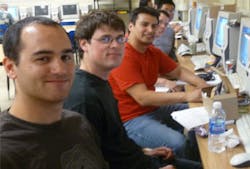Academic Program Schools the Next Generation in Simulation and Plant Operations
The Invensys Academic Program was developed to help universities prepare chemical and industrial engineering students for their future careers. It builds on the company’s strong ties in the academic world, including more than 10 years of research-specific work.
“The same software used by the largest companies in the world can now be used by students, who will come out of school with the competencies required for industrial organizations and for successful careers with those companies,” says Jila Mahalec, Ph.D., manager of the program. “Students will gain virtual-plant experiential learning by using SimSci dynamic plant models integrated with real-time operations visibility through Wonderware HMI software.”
Using this combination of software, students get to practice advanced process control in a virtual process control lab. “This virtual process control layer is unique,” explains Mahalec. “It uses, Invensys’ DYNSIM operator training simulator to enable teach process engineering functions such as control loop tuning.”
The DYNSIM software is also the basis of Invensys’ EYESIM virtual reality operator training system, which links control room operators to field operators and maintenance operators by means of a high-fidelity, 3D process simulation to create an immersive training environment. The U.S. Energy Department and West Virginia University are using the software now to create a “huge virtual reality implementation that includes a full power plant, chemical plant, turbine, CO2 plant and more,” Mahalec says. “We’re working on making a variation of this implementation available to others.”
Through the program, students also become eligible for a new global summer internship program that enables top students to work alongside Invensys R&D, technical and marketing personnel.
Participating schools get current commercial versions of software for special academic prices with automatic license renewal (to eliminate repeated paperwork). Students are not required to sign individual license agreements. Schools also get teaching examples and training videos, as well as technical support for designated professors and departmental IT personnel.
Richard Turton, Ph.D. and the Bolton Professor of Chemical Engineering at West Virginia University, explained, “I have been using DYNSIM in both my undergraduate courses and my research for the past five years. [The software] is easy to use, intuitive and very robust. When teaching undergraduates about real-life process plants, a dynamic simulator like DYNSIM is an invaluable tool. DYNSIM gives the students the ability to see how a process plant responds in real time to changes in operating conditions and external stimuli.”
Asked about the reasons for investing in an academic program at this time, Tobias Scheele, Invensys vice president of vice president, design, simulation and optimization for Invensys, said, “We have had good ties into the university setting for many years, but now is the time to take a more strategic view. There is an aging workforce within industry, and engineering disciplines are not as attractive as they used to be. This will help attract more people, and help make those people more competent on the first day of a new job.”
No matter if a graduating student works in the process or another industry, the correct prediction and diagnosis of real systems is fundamental to a successful career, says Turton.
“Using a dynamic simulator such as DYNSIM enables the student to get a head start in developing these crucial skills. For example, students are able to see how the liquid profiles in a distillation column evolves with time or how the pressure in a column may drift as the cooling water temperature is changed. These types of ‘real-life’ observations and experiences are invaluable in the training of future engineers. DYNSIM really adds to the realism and fidelity of these process models,” Turton adds.
The program helps Invensys, too. Not only does the company gain mindshare among new engineers, it also gets the benefits of many bright people exploring and testing the software in potentially new ways. The program “helps new minds use it and understand it, and helps us shape it,” Scheele says.
For more information about the Invensys Academic Program, visit the academic program website at: http://iom.invensys.com/EN/pages/SimSci_AcademicProgram.aspx

